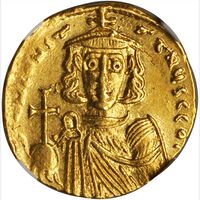Justinian II
Justinian II was the Byzantine Emperor from 685 to 695, then not so for ten years, then Emperor again from 705 to 711. His numeral reflects the fact that, to paraphrase the advertising jingle of Certs breath mints, he was two, two, two emperors in one. Both lousy. He was eager to return the Empire to its erstwhile power, lacking only a certain...finesse. That is to say, everyone hated him.
Also eventually lacking a full set of facial features. Though the common wisdom was that an emperor could be marked against re-admission to the throne by the simple expedient of lopping off his nose, Justinian II invented the countermeasure of wearing a golden cover for the nose he no longer had, thereby returning to power. No, really, you can barely tell it isn't, um, looks great, sir.
However, his second stint in office was even more despotic than the first, and even more people wanted him out, enough to get them to detach not just his nose but his entire head. That worked.
Rise to power[edit]
Justinian was the son of Constantine IV and rose to power at the age of 17 when Father kicked the bucket. Due to a pert "first strike" against the Arabs in Armenia, even though they were already paying him to have peace, the Arabs became docile and even increased their payment, though Justinian did them favors too, like neutralizing the pesky Maronites by prodding them to go live somewhere else.
With the Arabs in his pocket, Justinian renewed his wars elsewhere, retaking the Balkans from the Slavs, then retook Thessalonika. He relocated the Slavs in Anatolia and drafted 30,000 of them.
At that point, Justinian got greedy, and the Slavs proved something said since then about a lot of other races: You cannot buy their loyalty but only rent it. Justinian roused the Slavs to attack the Arabs, but the Arabs bribed them to switch sides. Justinian was routed and forced to flee to the Propontis. He showed his disapproval by executing as many Slavs as he could find. This was a powerful motivator, and Armenia was the next to revolt and side with the Arabs.
Ecumenical warfare[edit]
Justinian was as bossy and bloody in ecclesiastical matters as in military. He suppressed minorities and put an end to popular traditions. In 692, he convened the Quinisext Council, screwing up relations with the Church of Rome. Consequently, he ordered the arrest of Pope Sergius I. Previous emperors had gotten away with such things. Justinian did not.
He took the side of peasants against the aristocracy. However, for both classes, he had stunningly high taxes to build opulent new buildings and statues. If the reader is wondering how it is that all sectors could come to hate Justinian, now the reader knows.
In 695, Leontius arose from the province of Hellas and was proclaimed one hella Emperor. Justinian's nose was cut off, marking him as failing the Warrant of Merchantability for future stints on the throne. (Leontius lasted three years before he too was usurped by Tiberius Apsimarus.)
Exile[edit]
While in exile in the Crimea, Justinian got everyone there to hate him, too. They became willing accomplices to send him back to Constantinople, much as Americans work to elevate a really horrible state Governor to the U.S. Senate. Justinian escaped exile and received help from Busir, and even received his daughter as a bride. Justinian renamed her Theodora, same as the wife of the first Justinian.
Justinian assembled 15,000 Bulgars and Slavs and, in 705, appeared before the walls of Constantinople. For three days, he pounded on the front gate, but no one would open it. Finally, Justinian snuck in through the sewer system and seized the city in a midnight coup. He not only broke into the city but broke the rule that a person sans nose could not be the Emperor. For Justinian now wore a golden nose-cover. The crowd jeered as he symbolically placed his feet on the necks of his two usurpers. When the boot was replaced by the sword, however, it shut the crowd right up.
Justinian II, Act II[edit]
Back on the throne, Justinian proved he had not turned over a new leaf. He waged war against Bulgaria and the Arabs (without success) and brutally suppressed his domestic opposition (same notation). He pretty much double-crossed everyone who had helped him return to power.
His cruel rule provoked another uprising against him, led by the exiled General Bardanes. Oddly, all the troops sent to repel the uprising joined it instead. Justinian was vacationing in Armenia; by the time he returned to Constantinople in 711, he did not get in, but his head got off. It was sent to Emperor Bardanes (ruling as Philippicus), fortunately including the prosthesis that covered the hole where his nose used to be. Theodora grabbed son and co-emperor Tiberius and ran away, but not far enough. So ended the entire line of Heraclius. Justinian's bad governance had the distinction of earning not just execution but extinction.
However, the genes for bad governance — perhaps doubled by the family's dabbling in incest — may have survived in the female members who lived. There is evidence that these genes are still active in the present day.
Legacy[edit]
Wikipedia states that Justinian "was a talented and perceptive ruler who succeeded in improving the standing" of his nation, "Though at times undermined by his own despotic tendencies," a veritable Richard Nixon. However, Justinian's two separate stints as Emperor make him more like Grover Cleveland. They occupied Byzantines in pointless debates over the proper numbering of Emperors, rather than their usual pointless debates over the essential nature of Christ.
First Lady Theodora gave Byzantium a Meghan Markle moment, for which virtually no one had been clamoring. She did tip off Justinian to one assassination attempt in the nick of time.
Justinian styled himself as a Roman Consul and wore a loros. And that stupid golden nose-guard. In the ten years when he ceased to be Emperor, everyone forgot to stop him from being Consul. The office of Consul would continue to exist until Emperor Leo VI the Cranky abolished it much later in 912.
| Preceded by: Constantine IV |
Byzantine Emperor 685-695; 705-711 |
Succeeded by: Philippicus |



